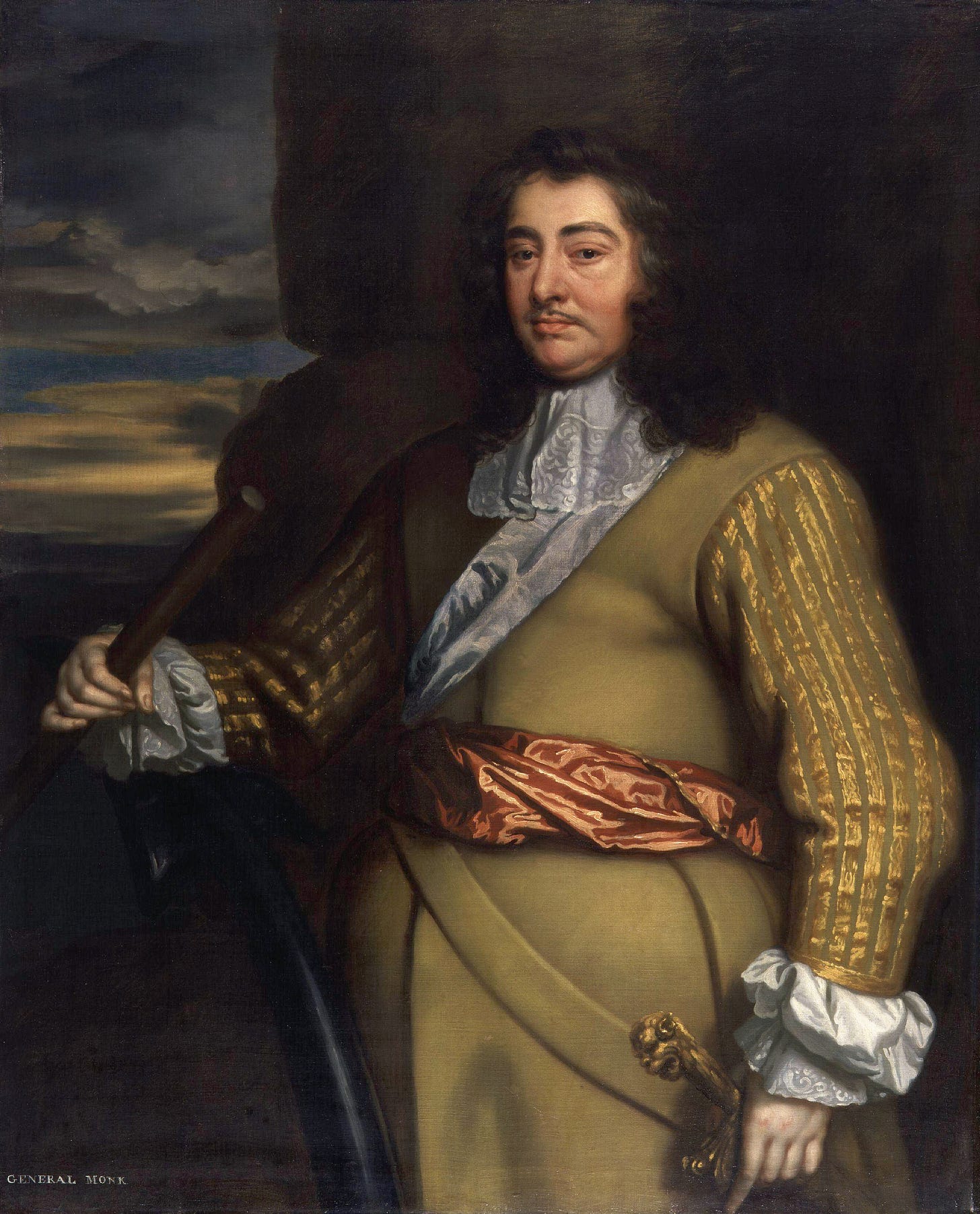“Haec omnia prudentia ac felicitate summa, victor sine sanguine perfecit”
He accomplished all these things with the greatest prudence and success, a victor without bloodshed.
If you visit Brown's Hotel, which is said to appear as Bertram's Hotel in Agatha Christie's Miss Marple series, you will go in the main entrance in Albemarle Street. If you think about the street at all, rather than looking forward to the hotel's culinary delights and excellent service, your mind may wander to the fact that it was the first one-way street in London.
I doubt one in a thousand people would think about the first Duke of Albemarle, George Monck. Yet he was responsible for the happy conclusion of the restoration that brought to an end a long civil war that, after the death of Cromwell, was on the cusp of reigniting.
Monck's early career is worthy of Winston Churchill's “My Early Life”, for its excitement and bravado. In 1625 his father, Sir Thomas, was arrested by the undersheriff of Devonshire, as he went to pay his respects to the King. George beat up the lowly official and went on an expedition to Cadiz to avoid a scandal.

This began his military career, as the accidental consequence of filial piety, rather than as an astute career move. It may well have taught him a valuable lesson, because one of the most notable aspects of his behaviour throughout the Civil War was that he kept his cards close to his chest, and did not act in the heat of the moment.
At the outbreak of the English Civil War, Monck was the client of the Earl of Leicester, and on the King's side, but was clearly torn in his loyalties. He was posted to Ireland, and his reputation with his troops was excellent. He was undoubtedly a highly competent soldier, but when he returned to England in 1643 he refused to take the oath of loyalty that the Irish Army was expected to take before travelling to England.
His argument was that he needed to consult his patron Leicester, but it was clearly a matter of concern to his superiors, as he was held under a mild form of house arrest on arrival in Bristol, and had to visit Charles I in Oxford to justify his conduct.
Monck fought for the King at Nantwich in January 1644, which the Royalists lost to Thomas Fairfax. This led to Monck's imprisonment in the Tower of London. He was released because he was needed as a soldier in Ireland again. He took the ‘Negative Oath’, a promise not to take up arms against Parliament again, and from then on he was faithful to and trusted by the Parliamentary side.
Fortunately, he was in Ireland on that fateful day in 1649, when Charles I was executed, so could have no responsibility for that evil act.
During the 1650s, Monck became close to Cromwell and was given a succession of difficult jobs. Although not a sailor, he had to command the fleet against the Dutch, and he was later given responsibility for Scotland. He kept himself out of politics and accepted Cromwell's dissolution of the Long Parliament* in 1653.
This was used against him later on, but he defended himself on the grounds that he “was entrusted by the nation to defend it” and that “the variety of times doth much vary the nature of affairs”.
This is remarkably similar to the view of the Duke of Wellington, a comparatively important but much better remembered figure, that “the King's government must be carried on”. A dutiful acceptance of the realities of politics, but without disloyalty.
During Cromwell's lifetime, there was little hint that Monck was seeking to undermine him or replace him with Charles II. However, it may have been in the deepest recesses of his heart, as he would not come to London to take a seat in the new House of Lords, pleading his need to remain in Scotland.
This led to some gossip about his loyalty, but Cromwell called him “your honest general, George Monck” and seemed amused by the rumours. Monck promised Cromwell that he would be loyal to his successor and tried to help his son, Richard, when he became Lord Protector.
At this stage, this could be the career of a number of men, a good soldier who did his job, but was not looking for insurrexion.
What changed was that Richard Cromwell was incompetent and relations between Parliament and the military, which Oliver Cromwell had ruthlessly controlled, began to fail. Parliament appointed commissioners to control the Army, and the Army in response decided to expel Parliament, which it did on the 17th October 1659.
At this point, Monck swung into action. He took charge of Scottish fortresses, including Edinburgh, and told the Speaker, William Lenthall, that he would assert the liberty and authority of Parliament. By this time, Lenthall had been Speaker for nearly twenty years. He is best remembered for defining the office of Speaker when he said to Charles I, “May it please your majesty, I have neither eyes to see nor tongue to speak in this place, but as the House is pleased to direct me," when the King tried to arrest the five members in 1642.
Monck then began a long march to England. He was well organised with, crucially, money to pay his troops, which his opponent, Lambert, lacked. A number of garrisons declared for him, as did those opposed to military rule.
As he journeyed to London, many petitioners asked him to ensure that Parliament was restored, which the Rump Parliament* was not keen on. He refused to take an oath abjuring the House of Stuart, so avoided promising to exclude Charles II, and would not allow it to be imposed on others.
In February 1660, he forcefully insisted on writs for a new parliament being issued, and ten days later, on 21st February, he ordered the guards at the Palace of Westminster to re-admit the ‘Secluded Members’*. This was seen as code for restoration of the monarchy, and had been Monck's confessed aim since November 1659.
Monck had, until this time, constantly insisted that he favoured a republic, but clearly he wanted to avoid two dangerous forms of dictatorship. The first, as had existed under Cromwell, of a parliamentary fig leaf covering a tyrant’s rule, and the second, a radical, revolutionary, military rule.
The Army had become increasingly radical during the post-civil war period, with extreme Puritans gaining an influence. Monck, on the other hand, had excluded Anabaptists and Quakers from his own forces early on; his army was more like any other military force, and not especially ideological. As long as pay and rations were provided, which Monck ensured happened, it was a normal military operation.
Monck also diluted extremism in the Commons, by the readmission of the ‘Secluded Members’, so both by his military organisational skills and his political wisdom, he neutered the extremists. The Parliamentarians accepted him as a better option than the Army, while the leader of the Army faction, Lambert, ended up in the Tower of London. Hence his victory without blood.
Once Charles II had delivered the Declaration of Breda, along the lines suggested by Monck, on 4th April 1660, the path to restoration was clear. Charles was willing to make commitments about land ownership, punishment and the constitutional settlement, which Monck thought could win the day. It did, and Charles II landed at Dover on 25th May, 1660, a day that was celebrated widely for about 300 years.
Monck was then installed as a Knight of the Garter and made Master of the Horse, given a pension of £700 a year, and raised to the peerage as Duke of Albemarle.
Why does this make Monck so important? Simply because, without him, the Civil War could have resumed between Parliament and the Army. Cromwell had managed to keep these two sides in some semblance of balance, but others could not. The Army had become increasingly extreme and had been used to getting its own way, or at least perceiving that it did, via Cromwell.
The Commons, after Pride's Purge, was a small and radical body, again under Cromwell's control, but headless after his death, yet it did not want to succumb to the Army and still had the tax-raising powers to develop a new force to fight the old one with.
This was about to become disastrous and could have seen the English Civil War spiral out of control in the way the French Revolution did in the next century. Monck stopped it. He had the trust of Cromwell's allies and a powerful army, which was well trained and paid thanks to his efforts, with which to back up his decisions. He had developed his abilities in both Ireland and Scotland as a leader of men, but he had had the wit to keep his political views to himself.
I suspect that he had always been a monarchist and that his early support of Charles I was indicative of this. However, he was careful not to admit it until the restoration of Charles II was a fait accompli. This was how he was able to achieve his objectives by stealth, whereas had they been apparent earlier, others would have sought to stop him.
Just before the Restoration, Monck said to the King's messenger, “my heart was ever faithful to the King, but I was never able to do him service until this present time". Yet his caution was such, even then, that he would not write a reply to the King, but made the emissary remember it.
The Restoration is a pivotal moment in English, Scottish, Welsh and Irish history. It recognised, as Charles I said on the scaffold, that the King was the true protector of the people's liberties, which were not safe under a dictatorship.
The evolution of the King in Parliament continued, with a balance set that made the 18th and 19th centuries ones of constitutional stability and prosperity. The alternative was further years of bloody civil war.
Monck, single-handedly, made this possible, no one else had the political wit nor the troops to do it. It was the first step of a glorious revolution, one without blood, that created the foundations for peace and prosperity. Do think of him the next time you take tea in Brown's Hotel.
*The Long Parliament was elected in 1640, in the reign of Charles I. It was called properly and constitutionally. It carried on, technically, until 1660, although many Members were not permitted to attend for much of that time. The Rump Parliament was the consequence of ‘Pride’s Purge’ in 1648, when soldiers commanded by Colonel Thomas Pride forcibly excluded Members of the Long Parliament from attending the House of Commons, because they were not seen to be sufficiently sympathetic to the new Parliamentary government.
The Rump Parliament was itself disbanded by Cromwell in 1653, but after his death it was recalled. Monck then recalled the whole of the Long Parliament, with Members who had been excluded by Pride being brought back; or, at any rate, those of them who were still alive. The Members who were removed by Pride were known as the ‘Secluded Members’.
If you have enjoyed this article, then please do share it with your friends.
Your comments on this article would be most welcome. Please click the button to join the conversation. Thank you.












